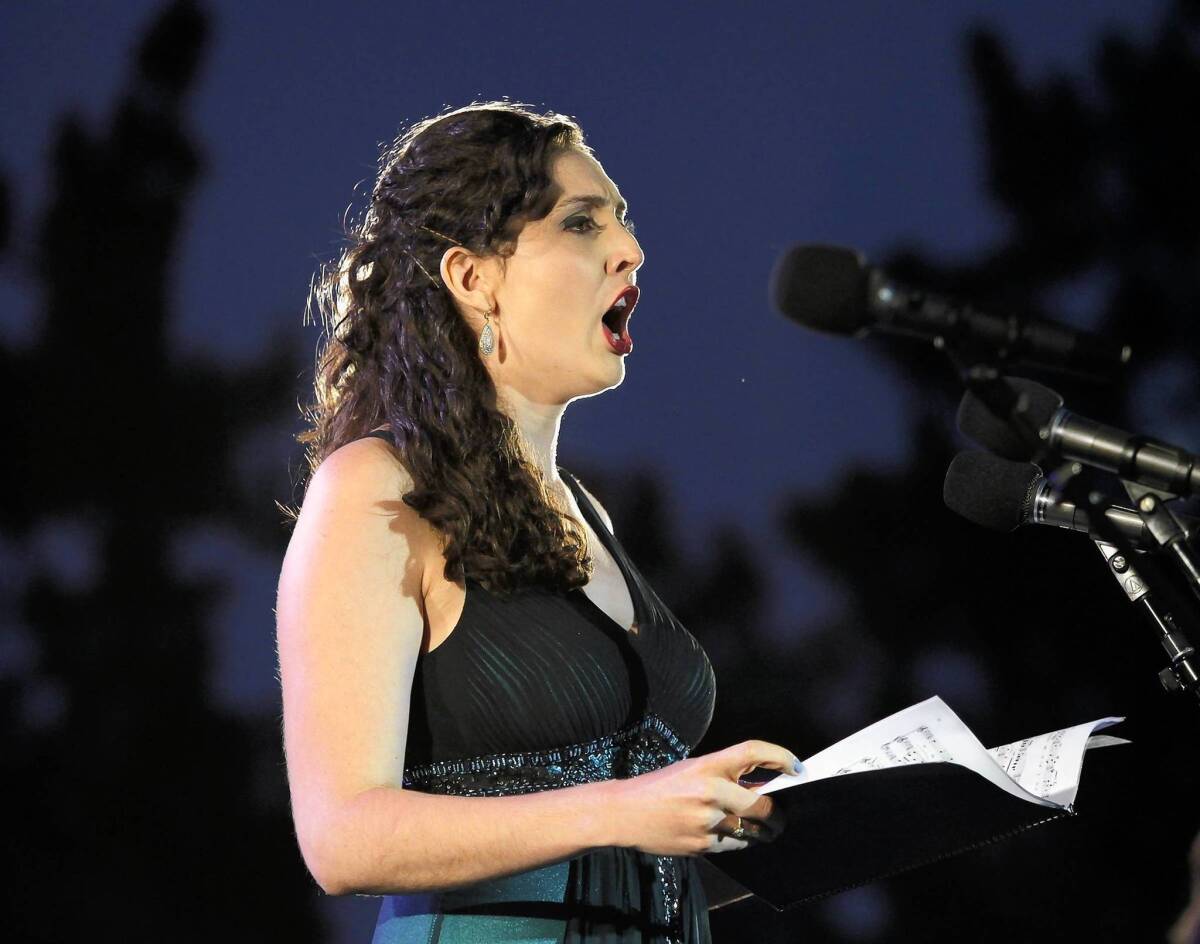Review: Colburn’s SongFest brings fervor to Bernstein’s ‘Songfest’

- Share via
SongFest is the remarkable summer vocal training program, begun in 1996, formerly at Pepperdine University and currently housed at the Colburn School. “Songfest” is Leonard Bernstein’s dozen songs for six singers and orchestra, written as a contribution to the U.S. bicentennial festivities in 1976 (but not finished until 1977).
On Saturday night, SongFest finally caught up with “Songfest.”
This was only the second full Los Angeles performance of Bernstein’s complete score. When the composer conducted the West Coast premiere with the Los Angeles Philharmonic at the Hollywood Bowl in 1983, then-Times music critic Martin Bernheimer, in these pages, called that the wrong place. Amplification robbed the work of textural intelligibility and orchestral subtlety. An alfresco ambience encouraged audience frivolity.
PHOTOS: Celebrities by The Times
SongFest’s “Songfest” was outdoors too, part of an all-Bernstein program hosted by Grand Performances at California Plaza downtown. Amplification was more brazen than the Bowl’s ever was. There could be no orchestral subtlety, since there was no orchestra; it was replaced by two pianos and percussion. The evening was windy and chilly. Helicopter racket at California Plaza is also more abrasive than at the Bowl.
But it wasn’t the wrong place for “a real right thing.” That line by Frank O’Hara ends the first song. Jamie Bernstein, who served as the evening’s host and cheerleader for her father, used it as a tag line for the whole work, as had Andrew Porter when he reviewed the piece in the New Yorker. I gladly join that chorus. “Songfest” is one of what I’d consider the three greatest all-American song cycles (William Bolcom’s “Songs of Innocence and Experience” and John Cage’s “Song Books” being the others).
Young singers brought, though not without struggle, fervor to words, which Saturday resounded over all obstacles. A grand gift to the public, Grand Performances, a free and freewheeling series, is democracy in musical action. Michael Barrett, who was closely associated with Bernstein, conducted with electricity and authority, making everything sizzle.
“Songfest” is a diversity-fest, a song cycle of acceptance. Texts come from many generations of American poets. Walt Whitman confesses to being “he who kisses his comrade lightly on the lips.” Beat poet Lawrence Ferlinghetti recalls his hormones awakening in a penny candy store. The Puerto Rican poet Julia de Burgos refuses to be the property of spouse or boss.
TIMELINE: Summer’s must see concerts
Conrad Aiken can’t hear music alone. Nothing to eat, nothing to smoke, ee cummings says, simply, “come on kid / let’s go to sleep.” Gertrude Stein intimates that when one in a married couple goes off alone to have a good time, “the one that was going came in all glowing.” In the most emotionally pungent song, the lips Edna St. Vincent Millay’s lips once kissed become unremembered. Three centuries ago, Anne Bradstreet found the depths of her love unfathomable. Less than a century ago, black poets Langston Hughes and June Jordon demanded to be America.
But what makes “Songfest” so affecting is not only that it is all-American but that it is also all Bernstein. Every poet seems to be speaking of or to the composer. Though the best-loved classical musician of his time, even Bernstein — especially Bernstein — sought acceptance, and he used every trick he knew to get it. The score is wickedly clever, jazzy, sentimental, pompous, personal and defensively sophisticated (for the Ferlinghetti song, Bernstein toys with what must be the first sashaying 12-tone series).
Still, “Songfest” struggles for acceptance. There have only been two recordings, Bernstein’s own in 1978 and one conducted by Leonard Slatkin in 1992, two years after Bernstein’s death. Performances since have been uncommon.
It was good then to spread riches around. SongFest used seven rather than six singers for the songs, which include solos and ensemble numbers. The standout was soprano Clarissa Lyons, who delivered “A Julia De Burgos” with angry, burning heat.
This was the first performance of John Musto’s arrangements, and piano and percussion could become grating, but pianists (Siyi Fang and Leann Osterkamp) and percussionist (M.B. Gordy) were strong.
PHOTOS: LA Opera through the years
After intermission, many more from SongFest turned to Bernstein’s far better-known show tunes from “West Side Story,” “On the Town,” “Candide” and “Peter Pan.” They sought an archaic spirit with spirited enthusiasm rather than make mid-20th century standards fresh.
Yet more, mostly younger SongFest singers got into the Bernstein act for a lunchtime concert Friday in the Colburn’s intimate Thayer Hall, where they explored Bernstein’s art song repertory. That included his final work, “Arias and Barcarolles,” a cycle of seven songs for three soloists and two pianos.
This is a summing up score. Bernstein looks back at the feelings on the birth of his son, on stories his mother told him. It ends with a dying composer’s memorials to friends who had died before him.
“Arias and Barcarolles” is also ignored. The deeply felt performance, coached by Barrett (who was a pianist in the premiere and first recording), gave this valedictory meaningful new life.
More to Read
The biggest entertainment stories
Get our big stories about Hollywood, film, television, music, arts, culture and more right in your inbox as soon as they publish.
You may occasionally receive promotional content from the Los Angeles Times.











